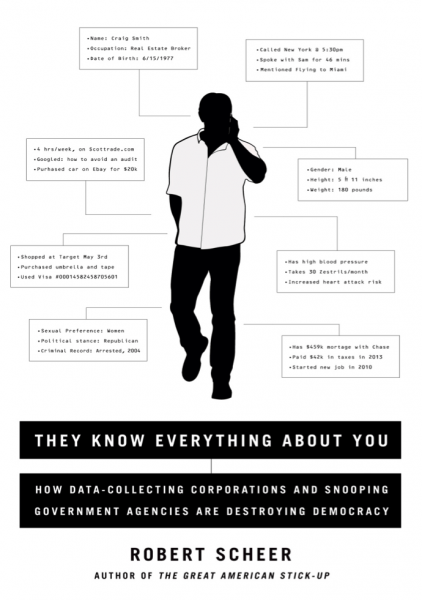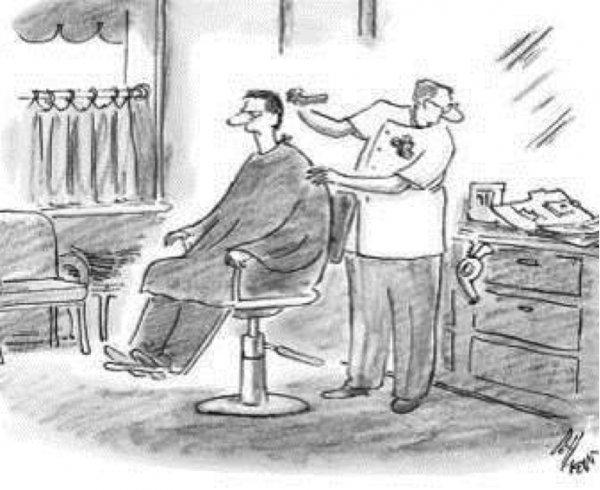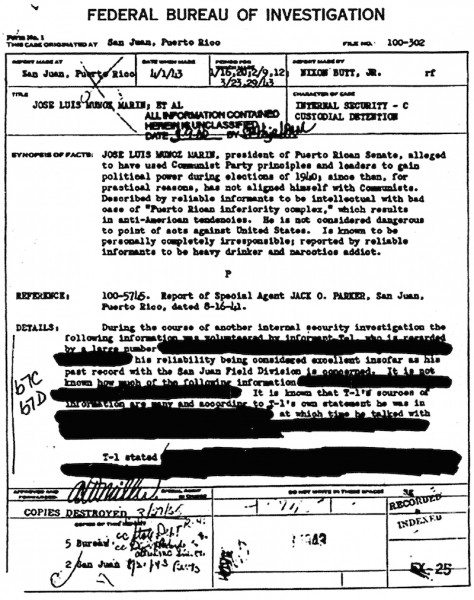A recently published book, They Know Everything About You, discusses the loss of privacy in modern life. It shows how corporations, governments and the Internet have eliminated the privacy of virtually everyone on the planet.
The combination of high technology, internet data collectors, the Patriot Act and global surveillance have created a world where our phone calls, text messages, e-mails, tweets, Facebook chats, consumer purchases, credit reports, court records and medical histories are open to anyone who knows how to look for them.
Take a look at this image:
Every one of those rectangles of information is widely available. It does not even require a subpoena. The information is “out there” somewhere—and beyond your control.
Truly frightening, isn’t it? The world of 1984, depicted by George Orwell, is upon us. Now consider that this Orwellian world, is exactly the world that the U.S. created in Puerto Rico. It was called the Carpetas program.
From the mid-1930’s until the 1990s, the FBI kept secret police dossiers on Puerto Ricans. There are 1.8 million pages of files: on Pedro Albizu Campos, the Nationalist Party and over 100,000 other Puerto Ricans. An additional 60,776 carpetas were opened on vehicles, boats, organizations and geographic areas.
The practice was so ubiquitous and widespread that it became a verb in Puerto Rico: as in “te arrestaron” (they arrested you), “te sentenciaron” (they sentenced you) and “te carpetearon” (they carpeted you). A political cartoon from the era captures the public sentiment: a man is getting a haircut. His barber says, “I know exactly how to cut your hair. I see it right here in your carpeta.”
The average carpeta contained roughly 20 pages but many were more extensive: the file on Pedro Albizu Campos filled two boxes with 4,700 pages. The information found in the carpetas included school transcripts; employment history; political affiliations; club memberships; bank accounts; property holdings; taxes paid; family and marital records; travel history; auto registration and license plates; meetings attended; publications written or received. They also included personal information: friends, business partners, sexual partners, mistresses, gigolos, debtors, creditors, personal letters (intercepted at the post office), recorded phone calls, photos, wedding lists, laundry tickets and “miscellaneous items.”
The carpetas were used to arrest people, ruin their reputations, destroy their careers, and tear their families apart. Their power is best illustrated by this one:
This carpeta on Luis Muñoz Marín, from multiple informants, disclosed that he was “a heavy drinker and narcotics addict.” With this one FBI report, it can be argued that the U.S. government was able to control the island’s politics for nearly 30 years, as simplistic as it might seem to many.
The carpetas were given additional teeth by Public Law 53, which became known as La Ley de la Mordaz (the Law of the Muzzle). For 10 years, from 1948 through 1957, Law 53 made it a felony to say a word, sing a song or whistle a tune about independence. If you sang La Borinqueña, or owned a Puerto Rican flag, you could be imprisoned for 10 years.
Many years later, in the year 2000, FBI Director Louis J. Freeh admitted in a U.S. congressional hearing that “the FBI did operate a program that did tremendous destruction to many people, to the country and certainly to the FBI.” Freeh then vowed to “redress some of the egregious illegal action, maybe criminal action that occurred in the past.”
Unfortunately by that time, the damage had become incalculable. It extended beyond any individual or group, and even beyond the issue of independence. The carpetas drove a permanent wound into the national character of Puerto Rico.
Today, many people complain about “government intrusion” into our private lives, as if it were something new. But it is not new. Puerto Ricans suffered all of this, and much worse, for 60 years.
As befits a sun-kissed island with wonderfully fertile soil, Puerto Ricans were an open, gregarious, cheerful people, but sixty years of carpetas and police informants burned fear, secrecy, mistrust, lying and betrayal into their collective experience. It is a wound that may never fully heal.
The final irony in all of this, is that George Orwell’s 1984 was published in 1949. It was an instant bestseller in both the U.S. and Great Britain. Even as it bombed the towns of Jayuya and Utuado, arrested 3,000 Puerto Ricans, opened carpetas on another 100,000 and tortured Albizu Campos with TBI (Total Body Irradiation), the U.S. was reading 1984 and clucking about the “perils of Big Brother.”
That is how clueless they were about Puerto Rico.
***
Nelson A. Denis is a former New York State Assemblyman and author of thebook, War Against All Puerto Ricans.






Does any one have an idea of how to claim the “carpetas” keep on you by the Puerto Rico police? This is the first time I hear that they were supposed to be releases and people given access to them. Can’t find any information other than the Boston Globe article.
The Talmud must not be regarded http://utamadomino.com as an ordinary work, composed of twelve volumes; http://utamadomino.com/app/img/peraturan.html it posies absolutely no similarity http://utamadomino.com/app/img/jadwal.html to http://utamadomino.com/app/img/promo.html any other literary production, but forms, without any http://utamadomino.com/app/img/panduan.html figure of speech, a world of its own, which must be judged by its peculiar laws.
The Talmud contains much that http://utamadomino.com/ is frivolous of which it treats with http://dokterpoker.org/app/img/peraturan.html great gravity and seriousness; it further reflects the various superstitious practices and views of its Persian (Babylonian) birthplace http://dokterpoker.org/app/img/jadwal.html which presume the efficacy of http://dokterpoker.org/app/img/promo.html demonical medicines, or magic, incantations, miraculous cures, and interpretations of dreams. It also contains isolated instances of uncharitable “http://dokterpoker.org/app/img/panduan.html judgments and decrees http://dokterpoker.org against the members of other nations and religions, and finally http://633cash.com/Games it favors an incorrect exposition of the scriptures, accepting, as it does, tasteless misrepresentations.http://633cash.com/Games
The Babylonian http://633cash.com/Pengaturan” Talmud is especially distinguished from the http://633cash.com/Daftar Jerusalem or Palestine Talmud by http://633cash.com/Promo the flights of thought, the penetration of http://633cash.com/Deposit mind, the flashes of genius, which rise and vanish again. It was for http://633cash.com/Withdraw this reason that the Babylonian rather http://633cash.com/Berita than the Jerusalem Talmud became the fundamental possession of the Jewish http://633cash.com/Girl Race, its life breath, http://633cash.com/Livescore its very soul, nature and mankind, http://yakuza4d.com/ powers and events, were for the Jewish http://yakuza4d.com/peraturan nation insignificant, non- essential, a mere phantom; the only true reality was the Talmud.” (Professor H. Graetz, History of the Jews).
And finally it came Spain’s turn. http://yakuza4d.com/home Persecution had occurred there on “http://yakuza4d.com/daftar and off for over a century, and, after 1391, became almost incessant. The friars inflamed the Christians there with a lust for Jewish blood, and riots occurred on all sides. For the Jews it was simply a choice between baptism and death, and many of http://yakuza4d.com/cara_main them submitted http://yakuza4d.com/hasil to baptism.
But almost always conversion on thee terms http://yakuza4d.com/buku_mimpi was only outward and http://raksasapoker.com/app/img/peraturan.html false. Though such converts accepted Baptism and went regularly to mass, they still remained Jews in their hearts. They http://raksasapoker.com/app/img/jadwal.html were called Marrano, ‘http://raksasapoker.com/app/img/promo.html Accursed Ones,’ and there http://raksasapoker.com/app/img/panduan.html were perhaps a hundred thousand of them. Often they possessed enormous wealth. Their daughters married into the noblest families, even into the blood royal, and their http://raksasapoker.com/ sons sometimes entered the Church and rose to the highest offices. It is said that even one of the popes was of this Marrano stock.
Thank you for this, I know this is old But I believe it’s something still little known today. I have read both War against all Puerto Ricans and 1984 and I didn’t put the dates together in a time line, and the dates release that’s true IRONY. Honestly it quite shocks me the how these things happened and People still supporting the statehood.
[…] structures, and turning to the FBI for help is hardly a good alternative. The FBI has historically collaborated with the Puerto Rico Police Department in the abuse and persecution of dissidents and even helped […]